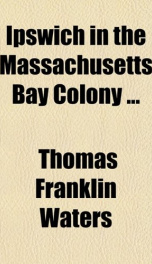ipswich in the massachusetts bay colony

Purchase of this book includes free trial access to www.million-books.com where you can read more than a million books for free. This is an OCR edition with typos. Excerpt from book: ' .- '..- l'm.- Ml ll.lllj' i' mi ..... ia.- V .ii.i. i ill ".i-i !. ,.:-..: Mil ..... ii,i, , ', ,. Uxjin.i 1i.i li 1, i W'.- - (jn-v . . ! lnlKnl ".'I l'.ii arc,l :,i 1| liath 'H- . l, ] "'ill-Ilt. W.'' in ..... -n t"..l i i'm-1t Iliiiv 1.i:;. t. - f ririn Mi! a. Kim :. . I .' . !'. -i ' ;(; - IIi-fny of :! chapter{Section 4CHAPTER II. THE COMING OF THE ENGLISH. Just when and where the first white man stepped upon the shores of Agawam we may not hope to discover. As early as 1608, as Captain John Smith mentions in his History of Virginia, Captain Harlow, Master of the ship Ordnance, touched here, while on a voyage in the interest of an English company, whieh included John Popham, Lord Chief Justice of England, to the grant it had obtained about the Kennebec. But one item of that visit has been preserved,"the people at Agawam used them kindly." Smith, himself, landed here in 1614, and says of Augoan.as he calls it, "this place might content aright curious judgement; but there are many sands at the entrance of the Harbour, and the worst is, it is imbayed too farre from the deepe sea. Here are many rising hills, and on their tops and descents are many corne fields, and delightfull groves. On the East is an Isle of two or three leagues in length; the one half plaine marish ground, fit for pasture, or salt ponds, with many faire high groves of mulberry trees and gardens. There is also Okes, Pines, Walnuts and other wood to make this place an excellent habitation, being a good and safe harbor." Thomas Morton in his "New English Canaan," and William Wood in "New England's Prospect" record the habit of the Indians of burning over the country in November. By this means, the dense undergrowth was destroyed, large tracts were made passable for th...
Users who have this book
Users who want this book
What readers are saying
What do you think? Write your own comment on this book!
write a commentGenre
if you like ipswich in the massachusetts bay colony try:
Do you want to exchange books? It’s EASY!
Get registered and find other users who want to give their favourite books to good hands!


